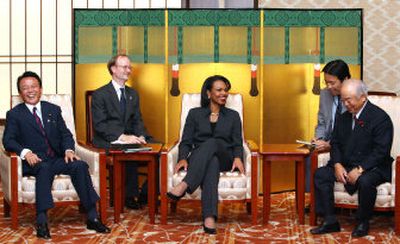Rice assures Japan U.S. will defend it

TOKYO – Japan “is absolutely not considering” building a nuclear arsenal in response to the North Korean nuclear test, Japanese Foreign Minister Taro Aso said Wednesday, moments after Secretary of State Condoleezza Rice reiterated that Japan was protected by the American nuclear umbrella.
Rice arrived here Wednesday at the start of a whistle-stop tour through northeast Asia and Russia to allay concerns and coordinate strategy against Pyongyang in the wake of the test.
The question of whether Japan would go nuclear has stoked fears within the U.S. government and increased tensions in the region. Earlier in the day, Aso told a parliamentary committee that while Japan’s non-nuclear principles remain unchanged, “it’s important to have discussions on the matter.”
The ruling party’s policy director on Sunday also urged a debate on whether Japan should develop its own nuclear deterrent. Japan is the only country in the world to have been hit with atomic bombs, and it has consistently refused to allow the United States to store nuclear weapons on its territory.
But experts say that Japan has a large supply of plutonium from its civilian nuclear power program and thus has access to the material necessary to switch quickly to a strategic program.
In response to a question at a joint news conference with Rice, Aso said: “There is no need to arm ourselves with nuclear weapons. For Japan’s own defense … we have the commitment, and that commitment has been reconfirmed by Secretary Rice.”
“Japan has answered this question,” Rice said. “The role of the United States is to make sure that everybody, including the North Koreans, know very well that the United States will fully recognize and act upon its obligations under the mutual defense treaty” with Japan.
Speaking to reporters as she flew to Asia, however, Rice acknowledged that a nuclear arms race is a concern, which is one reason she planned to use the trip to assure both Japan and South Korea that they remain under U.S. protection.
“I think through doing that we can mitigate some of the potential for a truly destabilizing set of events to take place in the region in response to the North Korean test,” she said.
Besides Japan, South Korea and Taiwan are considered potential candidates for a nuclear breakout.
On her trip, Rice plans to discuss various administration initiatives to thwart North Korea’s trade in illicit materials, but she indicated she would assuage concerns about a recent U.N. Security Council resolution’s provision authorizing states to inspect cargo bound to or from North Korea.
“What we are not looking for is inspecting every ship,” she said, adding inspections would be “information driven,” based on tips and other intelligence about North Korean intentions.
Japan, Rice’s first stop, has already imposed sweeping economic sanctions. A key focus of Rice’s trip will be China, which shares an 880-mile land border with North Korea and is responsible for much of the trade between the reclusive communist country and the outside world.